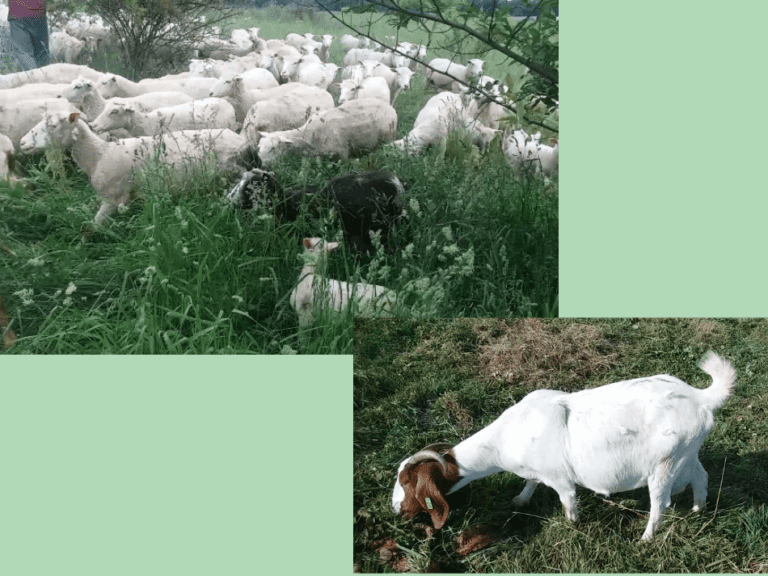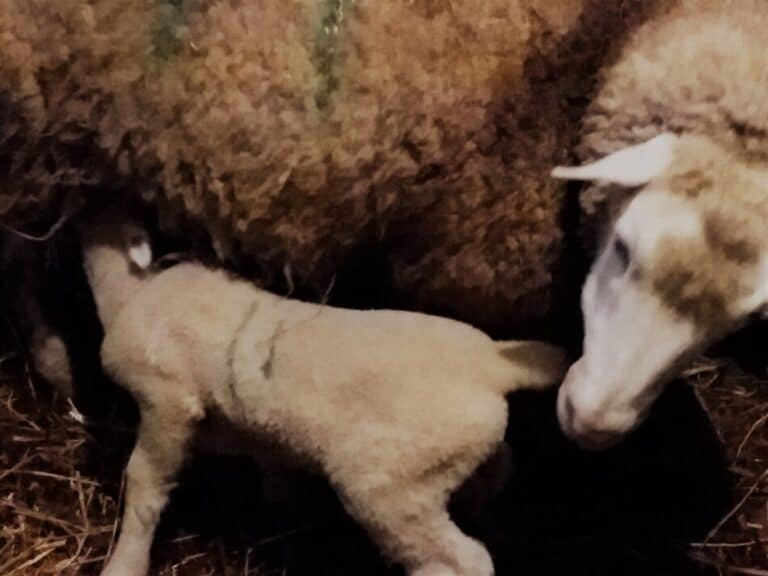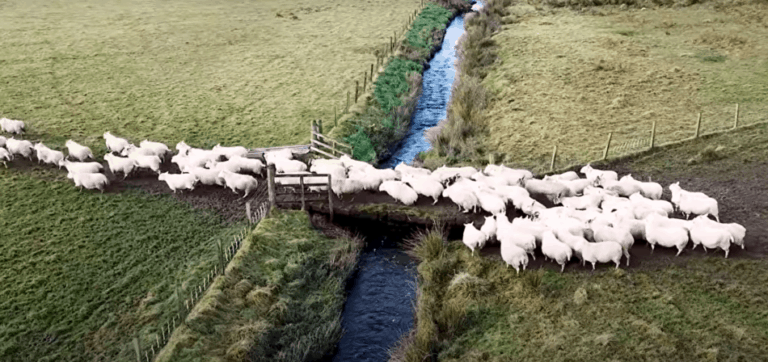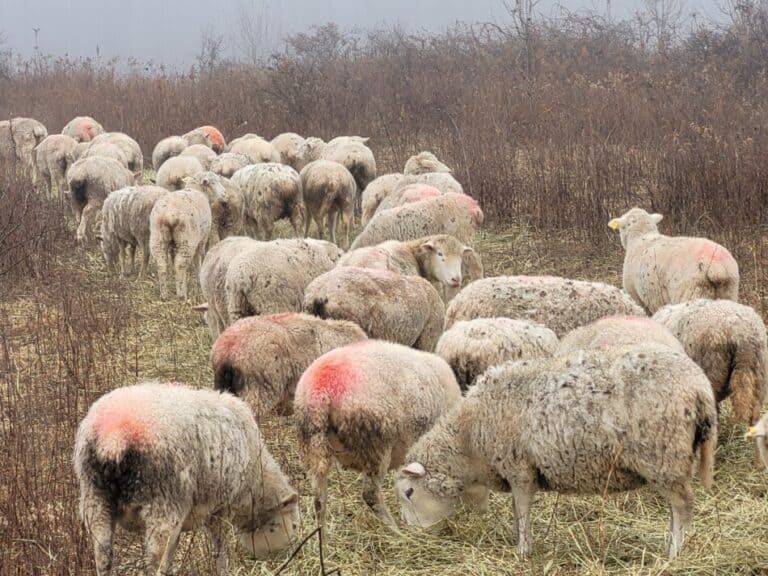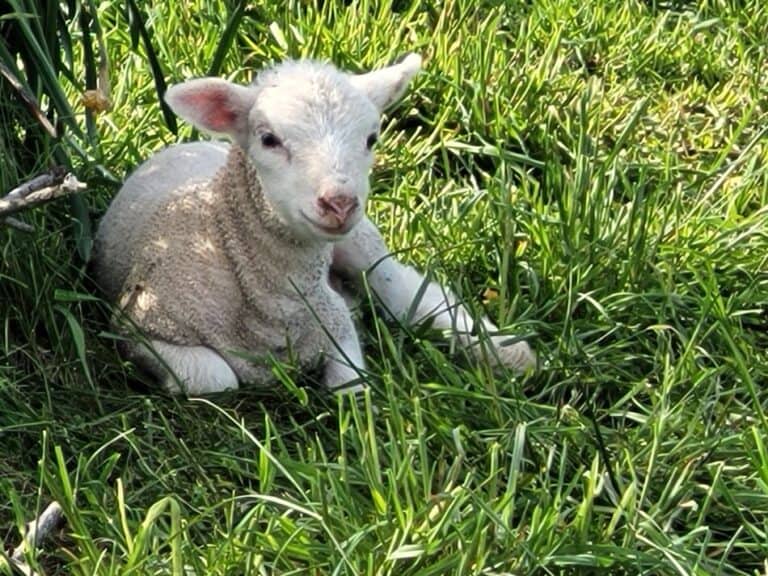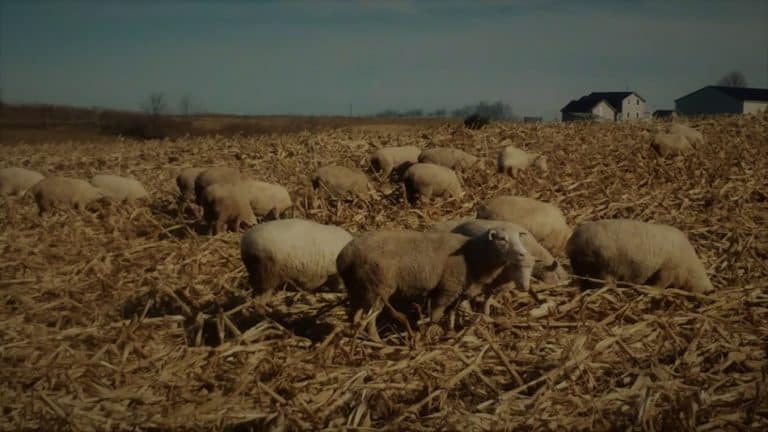5 Things Dorset Sheep Are Known For
Dorset sheep are frequently seen on small farms across the country. They are popular sheep that have a few advantages over some of the other popular breeds, but are they the right sheep for you?
We’ll go over both the good and the not so good about the breed so you can decide if Dorset sheep are the best choice for you and your farm.
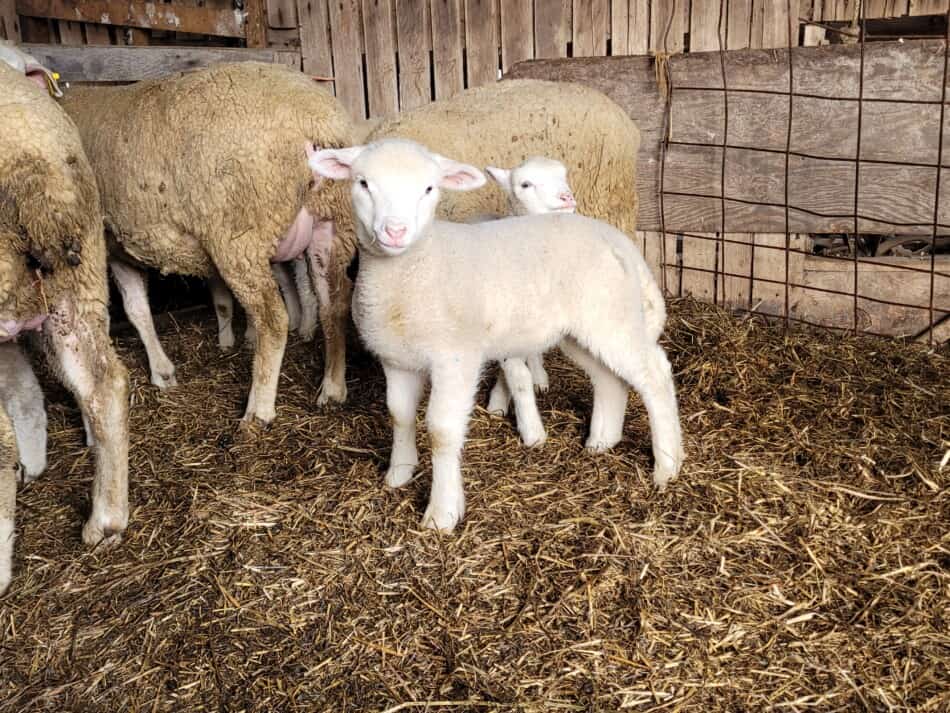
Dorset sheep are a meat breed that are excellent mothers
| Ram size | 200-275 pounds |
| Ewe size | 130-200 pounds |
| Appearance | medium sized white faced wool sheep |
| Best known for | year round lambing and mothering ability combined with good carcass traits |
| Disadvantages | not overly hardy, not all flocks have selected for year round breeding ability |
Dorset sheep are a popular polled (hornless) white faced breed of sheep.
You will see Dorsets listed as dual purpose, meaning that they are known for both carcass and mothering traits.
Poll Dorsets are well known for being excellent mothers.
Australian Poll Dorset Association
It’s interesting, the base of our flock is a Dorset and Polypay mix, so I tend to think of the Dorset’s maternal characteristics first, year round lambing and being good moms, with meatier lambs as a bonus.
To me, Dorsets are a meatier, maternal breed. But you should know that I’m definitely in the minority here, most folks consider Dorsets to be primarily a meat breed that also has maternal qualities.
Sheep For Profit is an article I wrote giving you an idea of what raising sheep will cost and how to find the numbers for both income and expenses in your area.
Popular small farm flock choice
Dorset or Dorset cross sheep are a very popular sheep for small farms, especially for anyone raising sheep in the eastern half of the country.
They are meat-type sheep with excellent carcass traits. Due to their moderate size and fast, efficient growth, they are profitable producers of lamb, milk, and wool.
Continental Dorset Club
Dorsets are fairly calm, good moms and have a meatier structure.
To really amp up the meatiness of the lambs, you could also cross your Dorset ewes with a terminal sire, which would further enhance the carcass traits of your market lambs.
In my area, it is popular for many sheep farmers to use a Dorset based ewe flock and cross on a Cheviot ram to get a meaty fast growing and early finishing 55-60 pound roaster lamb.
This way the producer gets lambs sold sooner, at 3 months of age rather than 6-8 months, and the price per head is just about the same.
Best Sheep To Raise For Profit is an article I wrote to give you a series of things to figure out to see which breed is best suited for you and your farming situation.
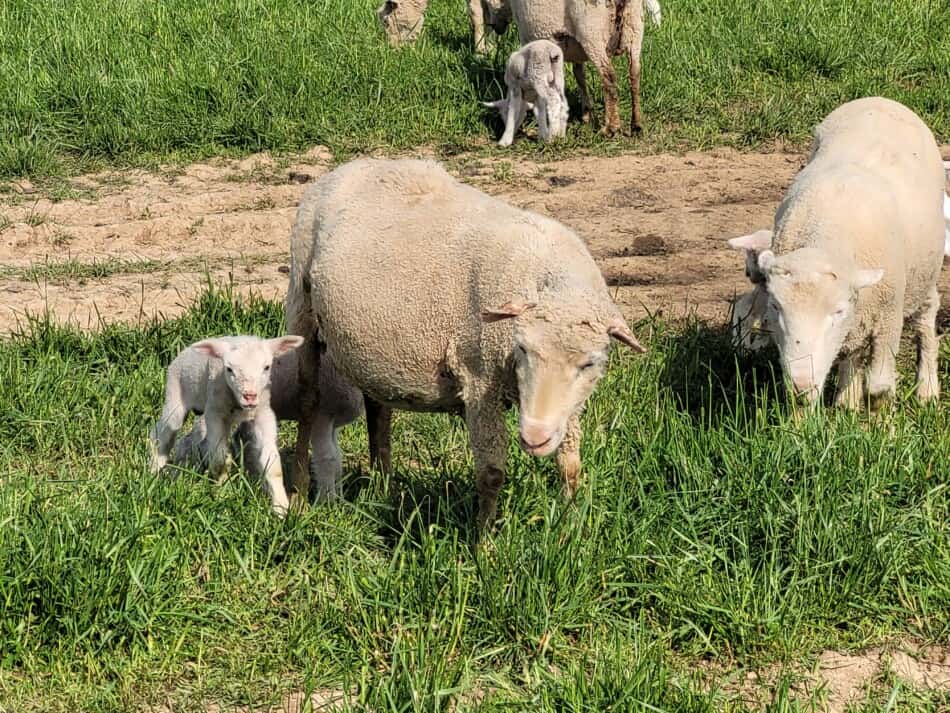
Dorset sheep have a year round breeding season
Dorset sheep can breed anytime of the year, which is unusual for a British breed. Sheep that can breed anytime throughout the year are usually of tropical origin.
Dorsets breed out-of-season, are excellent mothers and milkers, lamb with relative ease, and produce a high percentage of multiple births.
Continental Dorset Club
Most sheep will not come into heat in the early part of the year, they stop cycling until the daylight changes enough to let them know they can restart their reproductive cycle.
Dorsets keep their reproductive cycle going throughout the year.
Why do you care about this? Well, if your flock can breed anytime of the year, you can adjust your farm schedule to fit the demands of your area.
For instance, let’s say that everyone in your area sells market lambs in the fall, which means that the prices will be lower since the demand is also lower at that time.
What if you were to have your market lambs ready in late spring to early summer?
That would move you out of the supply glut in the fall and should get you higher prices for your stock, since you are providing sheep for the market at a time when most folks are not.
You’ll have to do the math to know if this is a good option for you, but with year round breeding sheep, it is an option that many other breeds do not have.
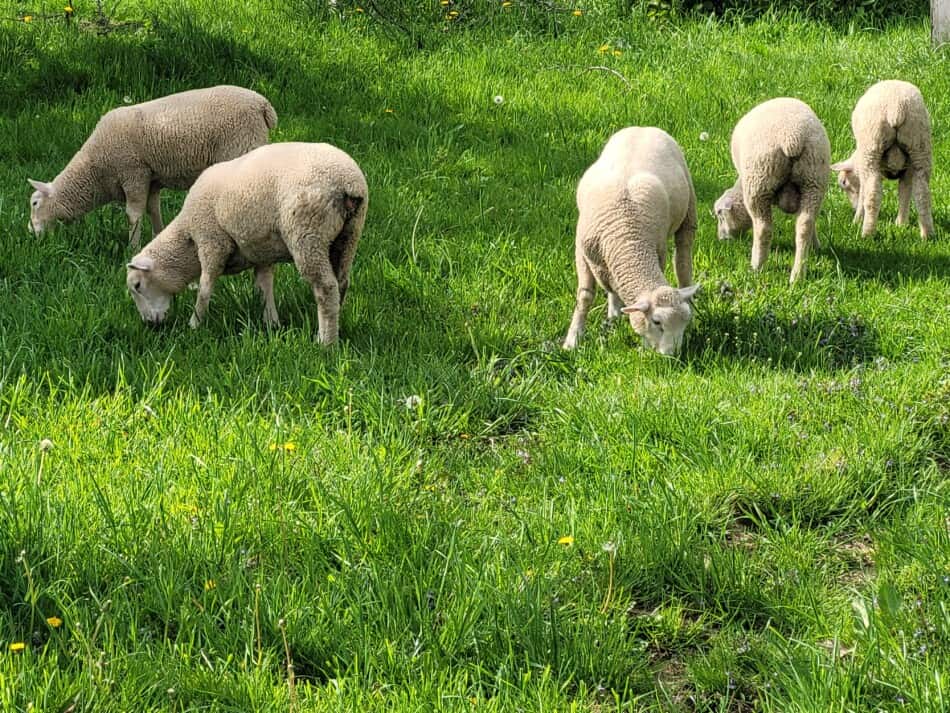
Another situation where a year round breeding sheep would excel is an indoor system where you would have rotating groups of ewes lambing every few months to supply feeder lambs year round.
This rotating system would spread out the work, so a farmer would not have all the sheep to deal with at once, spread out the income and would make use of the lambing facilities year round.
The catch here is that this requires more management, quite a bit of sorting off sheep and regrouping and importing all the feed to the barn, since the ewes and lambs would not be on pasture.
I’m not saying that is a problem, I’m just mentioning that this increased production will also require increased expenses. That only makes sense but it’s easy to overlook.
Make sure you have year round abilities in your sheep
If you plan to use the year round breeding advantage of Dorset sheep, be sure to select from a flock that is producing out of season lambs.
Why? It’s easy to inadvertently select away from a trait that the breed is known for but the breeder is not actively using and monitoring in her flock.
If you need the year round lambing, get your stock from proven year round lambing flocks.
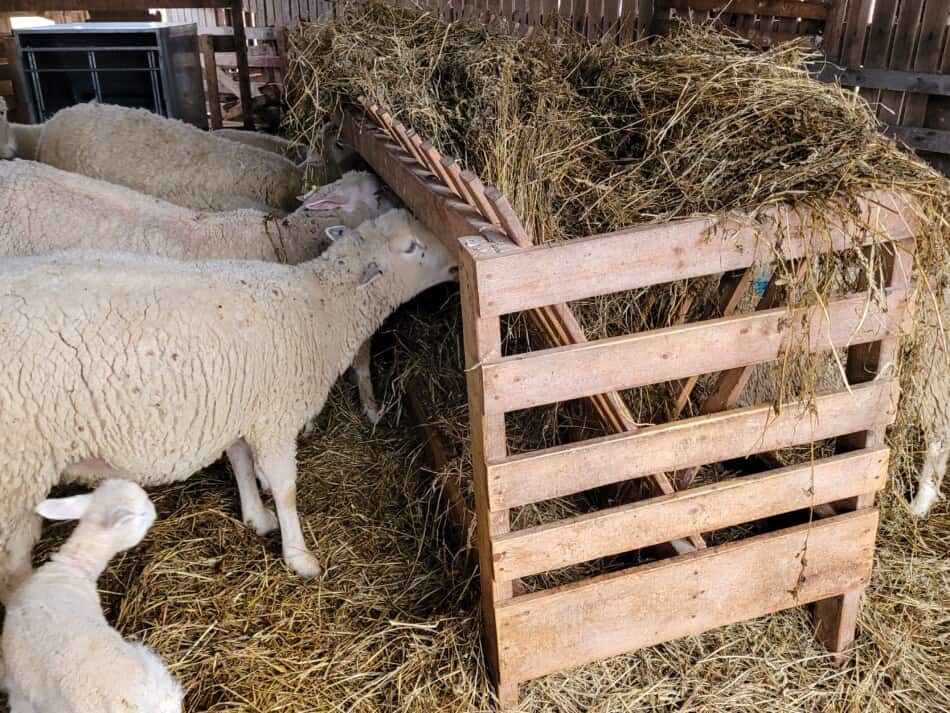
Dorset sheep can handle being inside
Not all sheep can handle being inside or they act like crazies when you go into the pen, too. Dorsets are fairly calm sheep overall, inside as well as outside the barn.
Why is this important? Most small farm sheep will end up inside the barn for some part of the year, and if you are working with out of season lambing, you’ll definitely end up with sheep in the barn.
It only makes sense that if you need to have sheep in the barn, that they find the barn acceptable and Dorsets seem okay with being inside.
Wool Canada, Dorset Sheep Polled is a Canadian Dorset Breeders list that mentions Dorsets being great for small holdings with intensive management and a good choice for a feedlot system.
There are Horned Dorsets, as well
There is both a horned and a polled (hornless) breed of Dorset sheep, with the horned ones being the original type and the polled developed from a mutation in the horned stock.
Horned Dorsets (also called Dorset Horn) are much less common than Polled Dorsets, so much so that when folks say Dorset, they generally mean the polled breed.
I went over just polled Dorset here, since they are more common type for folks to consider buying.
If you are interested in Horned Dorsets, which would be very similar to the polled Dorsets, start with The Livestock Conservancy Dorset Horn Sheep.
Dorset sheep disadvantages
Dorsets are wonderful sheep, we have some and like them, but still they have their drawbacks just like any other breed.
The following is a list of the potential downsides of Dorsets that I can think of:
- Some breeders can loose the year round breeding abilities of the Dorset as discussed above.
- Dorsets do not appear to be overly hardy. I’m not saying they are less hardy than most, just that they do not excel in handling things more on their own, they need a shepherd.
- You may not get the higher lambing percentages if you do not have the feed to support the ewes and you may need to lamb indoors to keep those lambs alive.
- The first week or so of a newborn lamb’s life is full of potential dangers, especially when you throw bad weather into the mix. To be sure the lambs born stay alive, consider barn lambing your ewes.
- These are wool sheep and many small flock producers are choosing to go with a hair sheep breed instead, due to the difficulty in finding or scheduling shearers in their area.
Summary
Dorset sheep are a solid choice for a small farm flock, especially if you are able to use your management to achieve their potential higher lambing percentages or want to make use of year round lambing.
As long as you have indoor facilities and high quality feeds to support this performance, Dorset is a great option for anyone wanting meaty sheep that is also a capable mom.
